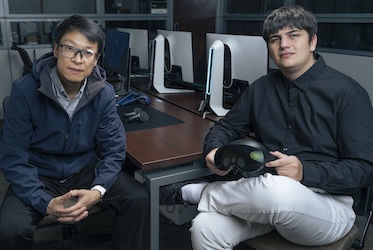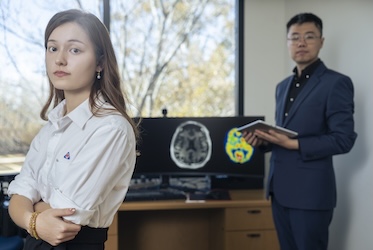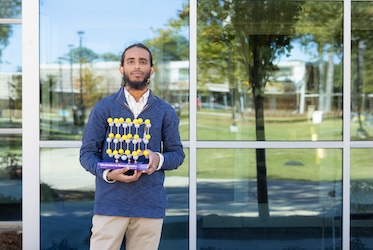

KENNESAW, Ga. | Dec 12, 2024

“AI technology is booming today, but even back then, research and engineering applications were developing,” Hwang said. “The company I worked for was already exploring AI applications for their cybersecurity solutions.”
Since completing his Ph.D. in Data Science and Analytics from Kennesaw State University’s College of Computer Science and Engineering, Hwang has started a new role as an assistant professor of cybersecurity at Montreat College in North Carolina, where he shares his expertise in AI and statistics with undergraduate students. This month he returns to KSU to accept his degree during fall Commencement.
When he began his studies at Kennesaw State, Hwang expected to delve strictly into AI algorithms from a computer science perspective. Instead, he learned of the fundamental role of statistics in AI model development.
“I expected to focus on AI algorithms from a computer scientist's perspective,” Hwang said. “However, I discovered that many AI models are built upon foundations in statistics. By the end of my Ph.D. program, I found myself becoming more of a statistician.”
Hwang’s journey was not without hurdles. The intense doctoral coursework, especially in mathematics, proved challenging. He dedicated extra time to studying and tackling math problems to overcome it.
“My biggest challenge was adapting to the statistical and probabilistic thinking required in AI,” Hwang recalls. “In traditional algorithms, you expect a precise output for a given input. But with AI, especially in generative models, the outcome is often probabilistic rather than exact. Each time you run the model, the result might vary, as long as it makes sense in context.”
Even with the challenges, Hwang found success. The Society for Imaging Informatics in Medicine conference in 2023 saw Hwang and his mentor, MinJae Woo, present research on assessing breast cancer risk in areas surrounding tumors. His poster presentation was honored as one of the best at the conference.
Hwang and Woo have worked together since 2021 when Woo served as his primary academic advisor. Hwang worked as his graduate research assistant on six research projects and developed seven manuscripts for conference and journal submissions.
“He will perform excellently in any environment and has proved himself as a well-rounded and skilled teacher and researcher,” Woo said.
When it comes to those who undertake the doctoral path that Hwang took, he said that it will require an interdisciplinary approach.
“You'll likely need to engage with theories and techniques from various fields, so avoid restricting yourself to a single domain during your Ph.D. journey. Embrace the opportunity to learn from multiple domains to broaden your impact,” Hwang said.
In his current research, Hwang is planning to implement generative AI and ChatGPT-like applications within hospital settings.
“Generative AI applications in the medical field are anticipated to enhance patient privacy through synthetic data, even if data is publicly shared online, thus making AI research on medical data more accessible to prospective medical AI researchers,” he said. “ChatGPT-like applications in healthcare can support clinical and laboratory research conducted by medical professionals, streamline communication among nurses, students, and patients, and ultimately improve clinical efficiency.”
– Story by Darius Goodman
Photos by Darnell Wilburn

Student, faculty researchers explore how AI can improve STEM learning through virtual reality

Student, faculty researchers use AI to improve early detection and diagnosis of Alzheimer's disease

Kennesaw State researchers use drones, artificial intelligence to improve disaster response

Research conducted by Kennesaw State student could lead to faster, more efficient electronics
A leader in innovative teaching and learning, Kennesaw State University offers undergraduate, graduate, and doctoral degrees to its more than 51,000 students. Kennesaw State is a member of the University System of Georgia with 11 academic colleges. The university's vibrant campus culture, diverse population, strong global ties, and entrepreneurial spirit draw students from throughout the country and the world. Kennesaw State is a Carnegie-designated doctoral research institution (R2), placing it among an elite group of only 8 percent of U.S. colleges and universities with an R1 or R2 status. For more information, visit kennesaw.edu.